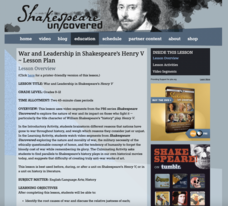National WWII Museum
Evaluating the US Decision to Drop the Atomic Bombs
While the use of the atomic bomb was the definitive end of World War II, the terrible weapons left new questions. Young scholars use primary sources and analytical worksheets to consider the implications of the fateful decision. Then,...
PBS
Catch-22: What It Means to Be a(n Anti)Hero
Catch-22, Joseph Heller's send-up of military organizational bureaucracy, provides readers with an opportunity to consider the importance of the anti-hero. Class members fill out a worksheet comparing and contrasting the qualities of...
American Battlefield Trust
1861: The Country Goes to War
While the firing on Ft. Sumter may have seemed like a sudden event, the long march to war spanned decades. Using games and a presentation, class members review the events that led up to the fateful April day in 1861 when brother turned...
National Endowment for the Humanities
The Gulf of Tonkin Resolution and Escalation of the Vietnam War
The Gulf of Tonkin Resolution propelled America's involvement into a bloody conflict—and it was based on a fallacy. Using the resolution and other documents from the Vietnam War, including declassified documents, young historians...
Friends of Fort McHenry
Citizens For and Against the War of 1812
Use this exceptional resource to examine the discourse and debate that occurred at the start of the War of 1812 with your class. Learners will first consider their own position on the war in a silent journal writing activity. Then after...
Curated OER
What Made George Washington a Good Military Leader? Powers and Problems
Learners list qualities they believe made George Washington an effective military leader. They discuss difficulties Washington faced as Commander-in-Chief and how he responded to the difficulties he faced as the leader of the Continental...
Curated OER
What Made George Washington a Good Military Leader?
Students list qualities they believe made George Washington an effective military leader. They discuss some difficulties Washington faced as Commander-in-Chief and describe his response to the Newburgh Conspiracy.
Curated OER
Draft Dilemmas
Consider the possibility of a new U.S. draft with this lesson, which encourages class debate and persuasive arguments. Middle and high schoolers discuss how such a draft might be enacted and how they would feel about it. They write...
Smithsonian Institution
Women's Role in the War Effort
Did you know that many women were Confederate spies during the Civil War? The resource focuses particularly on the important role women played for both the Union and Confederacy. It uses exercises such as a discussion, video, analyzing...
Smithsonian Institution
Cuban Missile Crisis
The United States—specifically John F. Kennedy—played a large role during the Cuban Missile Crisis. A history resource poses questions that encourage critical thinking as well as in-depth analysis of images from the time period.
Stanford University
Iraq Resolution
The 9/11 attacks propelled the United States into a period of low-grade war that has existed from that day all the way to current times. By looking at documents from the decision to send troops to Iraq in 2006, scholars connect the...
National History Day
Challenging the Status Quo: Women in the World War I Military
Why are some so resistant to change? The status quo is often to blame for a lack of forward movement in society. Following the events of World War I, women in America suddenly had a voice—and were going to use it. Scholars use the second...
The Formation of the Western Alliance, 1948–1949
Silence is golden—even when debating post World War II foreign policy. Using a silent debate format, young historians deliberate whether the United States should have kept a foothold in West Germany after World War II. A series of videos...
National Endowment for the Humanities
Ending the War, 1783
The various peace proposals, made by both sides, to end the Revolutionary War come under scrutiny in this final lesson plan of a three-part series on the war. Class members read primary source documents and compare them with military...
Alabama Department of Archives and History
A Worse Death: War or Flu?
In a lesson that integrates history and mathematics, class members create graphs that compare military death statistics from World War I with those that resulted from the influenza pandemic of 1918.
National Woman's History Museum
Rosie the Riveter: The Embodiment of the American Woman’s Economic and Social Awakening
Critical events force change. World War II forced a change in perceptions of and attitudes toward women. When thousands of men joined the military American factories were left shorthanded. Young historians investigate how media was used...
Curated OER
What Is War?
What kinds of human activity do we define as "warlike"? Middle and high schoolers examine various definitions of war and types of warfare, especially as these descriptions relate to the kinds of war we are witnessing at the beginning of...
Code.org
The Need for Encryption
Scholars investigate the need for encryption as they read a portion of the book Blown to Bits and discuss encryption techniques. They finish by attempting to decode a message written using a Caesar cipher.
Global Oneness Project
Documenting Architectural Heritage
Imagine going from being one of the richest, most important cities in the world to one of the poorest. Imagine the history captured in the architecture of such a city. Imagine these same now abandoned buildings being destroyed. How would...
Curated OER
African Americans in World War I - Lesson Two
Students explore the decision to allow African Americans enlist in the military. In teams of three to four, students debate allowing Muslim Americans to enlist in the war. Students not participating in the debate serve as legislatures....
Curated OER
African Americans and the Military of World War II
Fifth graders view a news reel of African Americans in World War II. In this World War II lesson plan, 5th graders discuss the newspaper clippings they get to view and hypothesize about why the African Americans use military news clips....
Curated OER
Military Strategy: Powell Doctrine
Students examine the life of Colin Powell and analyze several quotes regarding his military strategy. They discuss the ways in which his ideas have been implemented in current military policy.
Shakespeare Uncovered
War and Leadership in Shakespeare’s Henry V
“Compared to war all other forms of human endeavor shrink to insignificance.” “War is not healthy for children and other living things.” These two views of war, embodied in George Patton’s statement and Lorraine Schneider‘s famous 1966...
Heritage Foundation
Congress's Territorial Powers, Implied Powers, Citizenship, and the Bureaucracy
An informative resource gives scholars a look into why the US Constitution placed certain federal powers over that of the state. A variety of activities about constitutional clauses helps to create meaningful learning.

























